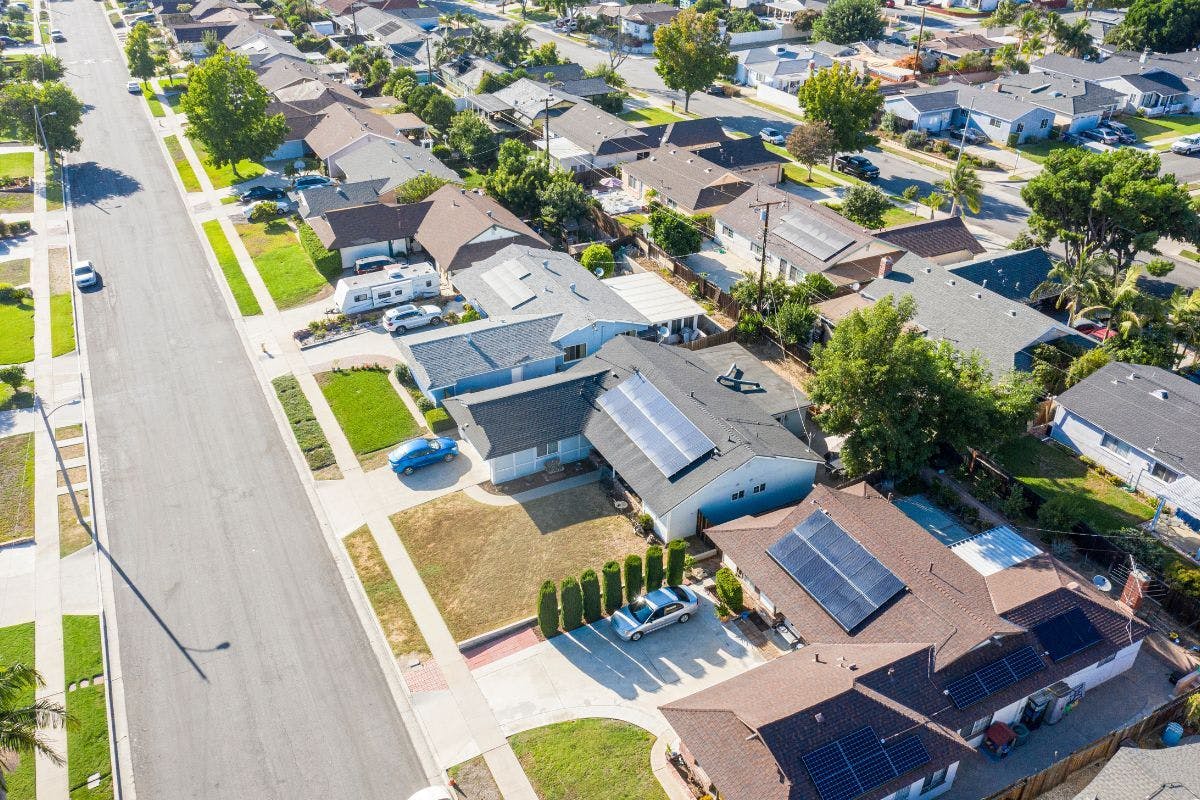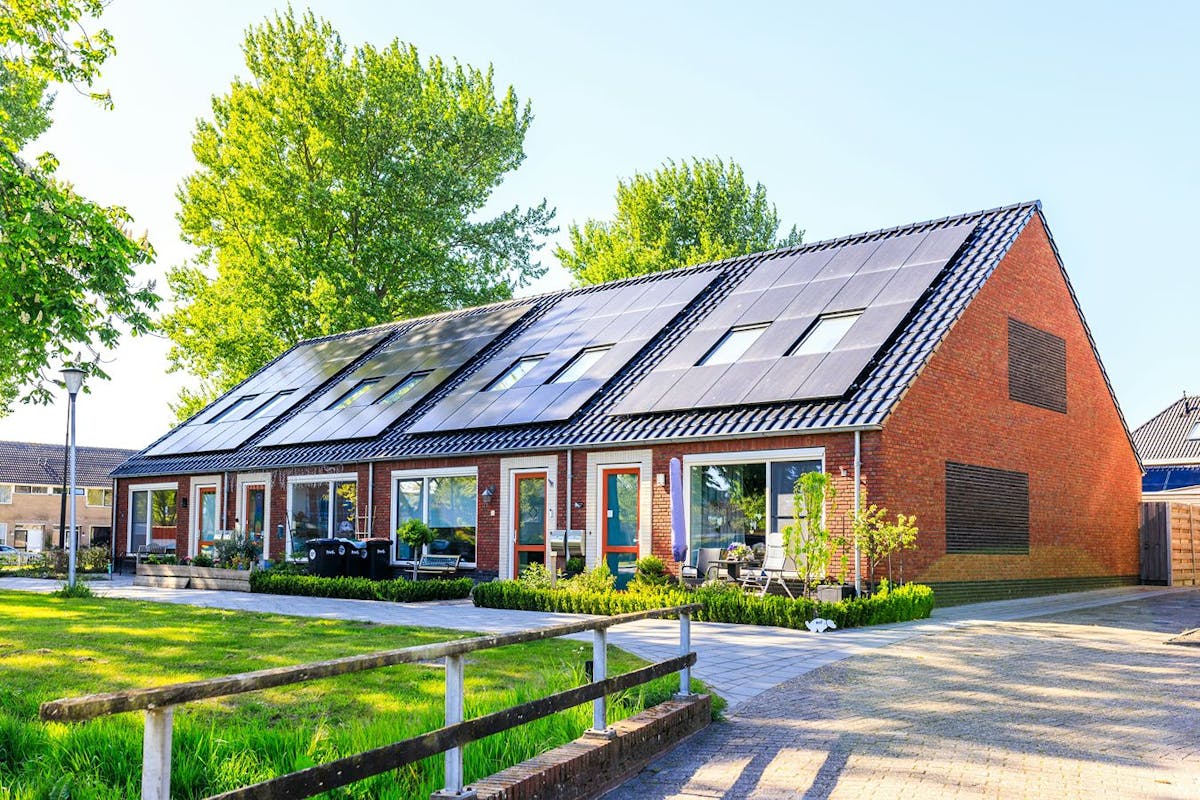How Much Do Solar Panels Increase Home Value?
Last edited

Author
Andrew Blok
Electrification and Solar Writer and Editor

Editor
Ryan Barnett
SVP, Policy & New Market Development

Solar panels are proven to last a long time. Current panels are built to work with certain levels of guaranteed efficiency for 25 years, and they often last longer. So, there’s a good chance you’ll look to sell, or buy, a home with solar panels on it. What happens if you’re selling a home with solar power? What is the likely effect on your home’s value with solar power?
Research shows that home solar panels increase home values. Along with saving money on utility bills, using clean energy, and having energy independence, the long-term benefit of higher home value is another reason to go solar.
See how much you can save by going solar with Palmetto
How Much Do Solar Panels Increase Home Value?
A few studies have looked at the increase in home value adding solar panels can provide:
- Homes with solar panels sold for 4.1% more on average than comparable homes without solar power. This translates to a $9,274 increase in the sale price for the median-valued US home, according to a Zillow study published in 2019.
- Solar power systems added $3.78 per watt to the value of a home on average, according to independent appraisers that evaluated home sales in California, Oregon, Florida, Maryland, North Carolina, and Pennsylvania as part of a 2015 study (PDF) by the Lawrence Berkeley National Laboratory.
- An average-sized solar array can increase the value of your home by approximately $15,000, according to data assembled by the Office of Energy Efficiency and Renewable Energy (EERE). The actual increase will depend on several factors including location, electricity rates, and system size, but it’s no surprise that 46% of homeowners have considered installing solar panels on their homes, according to a 2019 survey from Pew Research Center.
- Solar panels can add an incremental home value of about $10-$25 for every $1 reduction in annual energy bills, according to a study (PDF) by The Appraisal Journal. This study was completed in 1999, showing that solar increasing home values isn’t a recent trend.
- Home listings with solar power are on the market for 13.3% less time and are 24.7% more likely to sell for over the asking price when compared to non-solar homes, according to data from Rocket Homes. Their study suggests solar is a value-add for buyers and makes homes easier to sell.
These studies all demonstrate solar panels can have a significant return on investment in addition to the monthly savings they can provide.
How Solar Panels Increase Your Home Value
Solar panels might make your home more valuable in a few key ways.
- Lower monthly energy costs
- Reduced carbon footprint
- Increased energy independence
See how much you can save by going solar with Palmetto
Factors Influencing Your Home Value When You Have Solar
There are four key factors to consider when evaluating how much solar panels can increase the value of your home.
Location
Value increases can depend on the location of the home, as shown by the Zillow study. For example, homeowners in Riverside, California, enjoyed an average price premium of $9,274, while those in Orlando, Florida, saw a boost of $10,994. Hot markets such as Los Angeles and New York City experienced double the value increase at $23,295 and $23,989, respectively. At the high end of the market, those in San Francisco enjoyed a value increase of $41,658, or a 5.4% premium over non-solar homes.
Savings potential
Homeowners can use solar energy to lower their monthly energy bills by offsetting some of their electricity needs with the power generated by their solar array. Typically the higher the savings potential solar provides, the more value that can be added by going solar.
Your energy savings can depend on whether you’re buying or leasing solar, the electricity costs in your area, and your family’s energy consumption compared to what the solar panels generate, among other factors.
Many homeowners can further benefit from financial incentives and metering programs designed to promote renewable solar energy, including:
- Federal solar tax credit (Residential Clean Energy Credit)
- Net metering
- Solar renewable energy credits (SRECs)
Since each program has specific requirements, make sure you understand how the details apply to your situation.
Installation costs
Many people would like to install a solar energy system on their home, but they are concerned about installation costs, requirements, and timelines. For this reason, homes already equipped with a solar energy system may appeal to home buyers who are interested in solar but hesitant about the installation costs, even if those homes come with a higher purchase price.
Think of it as a combination of location and savings potential. If you live in an area with rising home values, high electricity costs, and consistent sunshine, installing a solar panel array can help you save money on your electricity bills each month, and then add value when you’re ready to sell.
Environmental values
Many homebuyers prefer solar-powered homes that reflect their environmental values by reducing carbon dioxide emissions and other greenhouse gas pollutants. By using renewable energy to power your home, you can lower your carbon footprint and help fight climate change. Many people are willing to pay more for a home if it helps them do the right thing for the planet and the environment.
See what solar can do for you:
Will Solar Panels Increase My Property Taxes?
A solar panel system adds to a property’s value in many cases. At the same time, you don’t want higher property taxes. Luckily, solar property tax exemptions in some states and localities allow homeowners or business owners to exclude the added value of a solar system from their property valuation.
| State | Property Tax Exemption? | State | Property Tax Exemption? |
|---|---|---|---|
| Alabama | No | Montana | Yes, for 10 years |
| Alaska | Locally only | Nebraska | No |
| Arizona | Yes | Nevada | No |
| Arkansas | No | New Hampshire | Locally only |
| California | Yes | New Jersey | Yes |
| Colorado | Yes | New Mexico | Yes |
| Connecticut | Yes | New York | Yes, for 15 years |
| DC | Yes | North Carolina | Yes |
| Delaware | No | North Dakota | Yes, for 5 years |
| Florida | Yes | Ohio | Locally only |
| Georgia | No | Oklahoma | No |
| Hawaii | Yes | Oregon | Yes |
| Idaho | No | Pennsylvania | No |
| Illinois | Yes | Puerto Rico | Yes |
| Indiana | Yes | Rhode Island | Yes |
| Iowa | Yes, for 5 years | South Carolina | No |
| Kansas | Yes, for 10 years | South Dakota | Yes |
| Kentucky | No | Tennessee | Yes |
| Louisiana | Yes | Texas | Yes |
| Maine | Yes | Utah | No |
| Maryland | Yes | Vermont | Yes, up to 50 kW |
| Massachusetts | Yes | Virginia | Yes |
| Michigan | Yes | Washington | No |
| Minnesota | Yes | West Virginia | No |
| Mississippi | No | Wisconsin | Yes |
| Missouri | Yes | Wyoming | No |
Note: The details of property tax exemptions may vary by state and over time. Ensure you know how your state's exemption works and consult your own legal and tax advisors.
You can find more information or state-by-state details from resources such as the Solar Energy Industries Association and N.C. State University’s Database of State Incentives for Renewables and Efficiency.
Going Solar With Palmetto
While the data shows solar panels can help increase the value of your home, it’s important to work with a trusted solar installation company that can outline your costs and savings to ensure a positive return on investment.
As a leading solar installation and maintenance company, Palmetto helps homeowners increase their energy savings and energy independence by delivering end-to-end solutions that decrease reliance on the electrical grid.
If you’re interested in installing solar panels, see how much they could save you at your home
See what solar can do for you:
Solar and Home Value FAQs
How much value do solar panels add to your home?
Data shows home value usually increases when homeowners add solar panels to their homes, though it certainly varies by home. A number of states provide property tax exemptions and other incentives or credits for installing a solar system, so these programs help the short- and long-term value of going solar.
Is it harder to sell a home with solar panels?
Again, while there is no one-size-fits-all answer, studies show it is easier to sell a home with a solar energy system, with a higher sale value on average.
How long will it take for solar panels to pay for themselves?
While you may see lower electricity bills in the short term, it will take time to break even and see the full return on your investment. You can read our guide on estimating the solar panel payback period. The most common estimate of the average payback period for solar panels is 6-10 years.
Disclaimer: This content is for educational purposes only. Palmetto does not provide tax, legal, or accounting advice. Please consult your own tax, legal, and accounting advisors.


